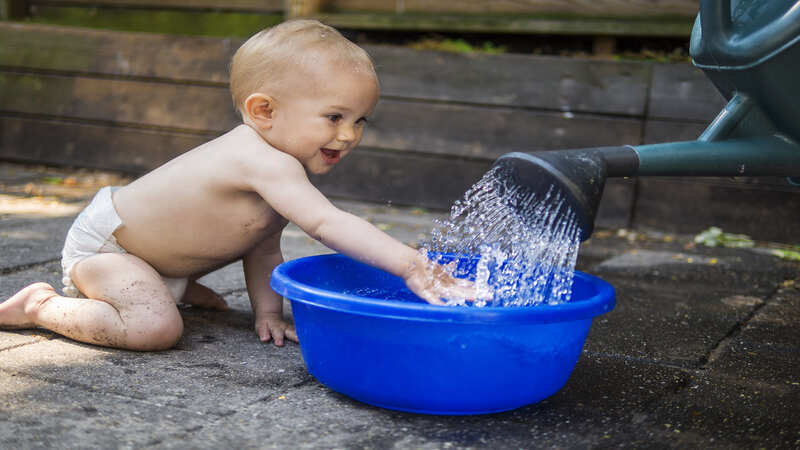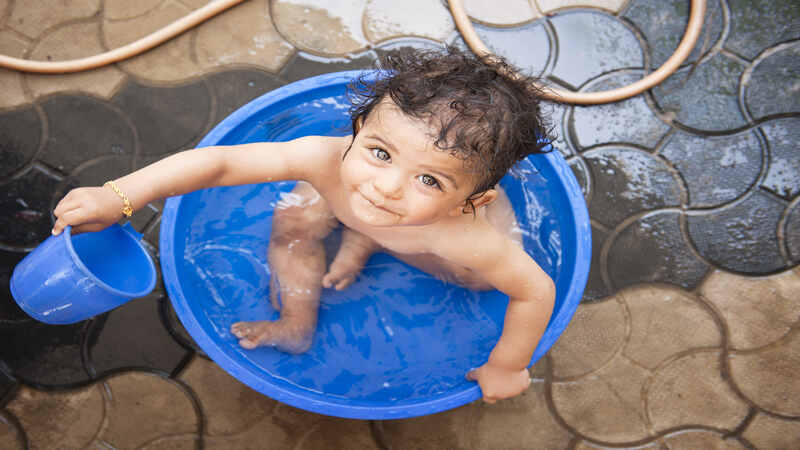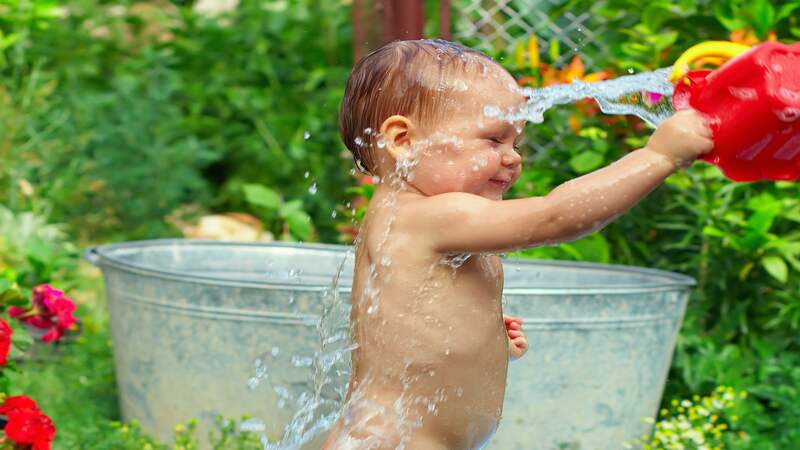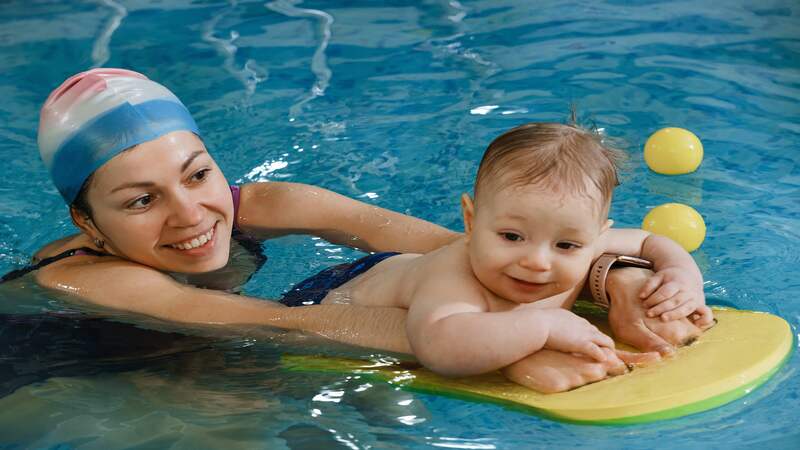
Babies love to play with water. After the initial few weeks when a newborn might fear baths, you will notice your baby starts enjoying the water, especially playing in it. When they get older, they love to just pour, make a mess and get themselves wet. It is the texture and the fluidity that attracts them and water play is the perfect way to satiate this attraction.
Parents can fear water play and try to avoid it for all the mess they have to clean, the colds the baby might catch, and the things they might ruin, but babies will love it! They enjoy playing with water anytime, anywhere. Water play can help in a baby’s development, in multiple ways.
In This Article
- What Is Water Play?
- Why Is Water Play Important?
- Benefits Of Water Play For Babies
- Water Play Activities You May Want To Consider
- FAQ’s
What Is Water Play?
Water play as the term suggests is just letting your little one play with water. It can mean playing with running water, using a bucket, mug, water toys, or even balloons to play with water. When a baby uses such tools to play with water, it is usually with a tub or bucket full of water or a water table that is specifically designed for water play.
Water play is a sensorial playing activity that involves kids experiencing water and exploring it in different ways.
Why Is Water Play Important?

Playing with water helps babies understand more about one of the most important natural resources – water. Playing with elements from the environment allows them to get a better understanding of the world they are living in.
Initially, water play may seem fruitless and just a waste of time, but this is a great way to engage your little one effectively. Water play can teach them concepts and help them develop skills, which might otherwise take longer.
6 Excellent Benefits of Water Play For Babies

Unlike many games babies play, water play need not be taught. Water play is one of the best options for free play, which can help your baby learn, understand and develop at the same time, without them realizing it.
Water play can benefit your baby in the following ways
1. Fine Motor Development
Squeezing a wet sponge, and fishing out items from the water, will require you munchkin to use their fingers more. it will help strengthen their grip and fingers in the process. Picking things from water is very different from picking them up from a dry surface. It requires more finger mobility and strength.
With time, you will notice that your baby starts pouring water from one container to another. This improves their hand-eye coordination, which is an important milestone. It will also improve their focus and concentration when they try to pour without spilling.
2. Gross Motor Development
Moving in water, be it on a slippery floor or in a tub of water, will require more balance. Your baby will have to use their bodies differently and engage more muscles to be safe on a wet surface. It helps in developing and strengthening the big muscles, which can be very useful as they grow and engage in more physical activities.
Even for young babies, playing in a tub of water will require them to exert more energy to move their toys in the water and to hold themselves upright.
3. Social Skills
When your baby plays with other babies, they learn to communicate and play together. Learning to share their toys or communicating ideas with each other to play their water game will improve their socializing skills.
When they play in a group, babies tend to watch others, observe and help each other. For example, if a baby starts filling a bucket with water, other babies will also join in and start collecting water in any container they can find and will fill the bucket. They will try new tricks and will understand the consequences of each of their moves. This is a very powerful method of learning.
4. Improves Creativity
Just give your munchkin a few items of different sizes and weights and a tub of water. They will come up with different games and unique ideas every time. It helps improve their creativity and stimulates their brain in different ways. They will think and try to use the items in hand in different ways, some might even surprise you.
5. Relieves Tension
Water play is a sensorial activity that engages your baby’s senses and draws their focus completely to the game at hand. It helps relieve tension and relax. Babies experience tension too but are completely unaware of it. It can help your baby regulate their emotions when they are experiencing big feelings.
6. Early Mathematical Skills
Volume and weight are important mathematical and scientific concepts. Babies will learn about these two concepts through water play activities. They will learn they can fill up the bucket faster with bigger containers and will need more turns with a smaller container. They can even use such activities to learn to count.
Water Play Activities You May Want To Consider

Not sure how you can let your baby play constructively with water? Here are a few activities that are just perfect to enjoy and learn from at the same time.
1. Sponge Play
This is one of the most basic and simplest water play ideas most parents will use at some point in their baby’s life. Apart from helping the baby develop finger strength, it will keep them occupied for a long time too. Sometimes, this break is worth the mess you may have to clean up later.
2. Bath Time
Let your baby sit in the bathtub for some time and explore the water in their own way. Once they learn to balance themselves in the tub, they will start splashing and trying to catch the water. They can use small toys like animal figurines and give them a bath, can use cups and practice pouring, or even try to fish out tiny toys from the tub of water.
3. Water Balloons
Now, who doesn’t like to play with water balloons? In India, it is a common habit to play with colored water balloons during Holi. You can avoid adding color if you are worried about the mess.
Give your baby a bucket filled with water balloons and a safe place for them to burst it in. Do not fill all the balloons to their limit. Let a few balloons have lesser water. When they are not full of water, they won’t burst easily. They will require more force. This can teach your baby about force and impact.
4. Play With Ice
Give your babies a few cubes of ice and watch them scream with glee! The cold ice will excite them and then disappoint them as it melts away. Babies might not understand what is happening, but they will learn that ice will melt. Older babies will start understanding it is the heat from their hands that makes the ice melt faster and when it is left on a tray, it will stay longer. Playing with ice will teach babies sensorial skills where babies will learn about the temperature and texture difference at different stages as ice melts into water.
This is also a great option for creative play. Babies can rub the ice on themselves and have a sensorial experience. You can let them put a few ice cubes in one box and a single ice cube in a cup of water. If you are not worried about a mess, you can explore with colored ice too.
5. Sink Or Float
Sink or float is a great way to introduce science to your baby. Let them collect random things from around the house and drop them in a tub of water and watch what happens. Some things will float, and some will sink. Babies will soon understand light items will float and heavy items will sink. They might then bring paper, which will initially float but will get soggy and sink. Similarly, light items with holes in them will also float first and then sink. Babies can learn a lot from this activity.
6. Duck Pond Water Play
In this game, toy ducks float in a tub full of water. The ducks have numbers mentioned underneath them. You can just call out the number and ask your baby to find it. This will improve their concentration as they have to find the duck with the right number. It will also teach them to read numbers.
Water play is a very fun method of learning. Babies will learn and understand concepts very effectively. Learning concepts will help babies do better in school rather than just learning something by rote, just because it is part of their portions.
FAQ’s
1. Can we Use Colors in Water Play?
Yes, you can use balloons filled with colored water, colored ice cubes, or even multiple containers with different colored water. You can let the baby pour from one container to another and understand how mixing colors can change it.
2. Is Water Play a Group or Individual Activity For Kids?
Kids can play by themselves or in groups. They learn a lot either way. If you let them explore on their own, kids will learn a lot from water play.
3. Is Playing With Ice a Form of Water Play?
Yes, playing with frozen water or ice is a fun way to teach babies about solids turning to liquids, due to heat. It is a fun sensorial activity too.

